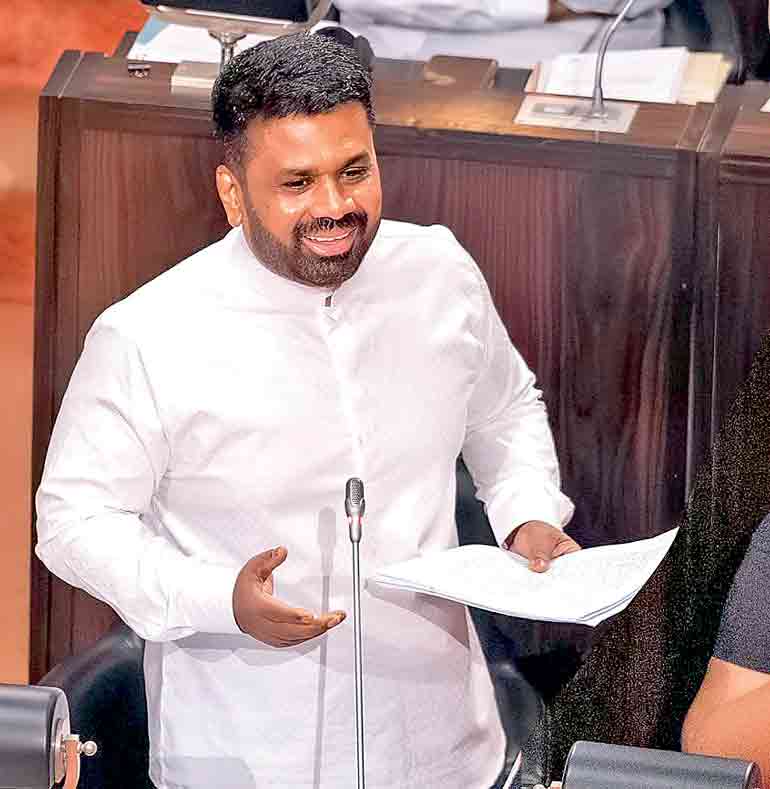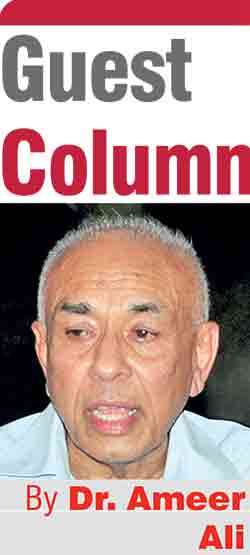Monday Feb 16, 2026
Monday Feb 16, 2026
Thursday, 20 November 2025 02:21 - - {{hitsCtrl.values.hits}}

President and Finance Minister Anura Kumara Dissanayake presents the 2026 Budget in Parliament on 7 November
 “A Budget should be balanced not by more taxes, but by reduction of follies” (Herbert Hoover).
“A Budget should be balanced not by more taxes, but by reduction of follies” (Herbert Hoover).
President cum Finance Minister Anura Kumara Dissanayake’s 2025 Budget has won kudos from several independent observers. Since he and the NPP took over the reins of Government pragmatism had been the guiding philosophy of the rulers and as a result the economy has speedily moved over from crisis to stability. Although the Budget’s expected growth rate target of 7% by the end of 2026 borders on exaggerated optimism in the context of IMF’s reduced growth rate of only 3.1% and persisting economic volatility in the ruling liberal economic order, the Treasury Secretary’s exuberant confidence over the Budget’s dependence on inclusive growth, export diversification, policy sustainability, production bias, rural development and digital transformation may have warranted that optimism.
Nevertheless, AKD’s Budget deserves credit because it reflects the proven transition of the economy from bankruptcy to stability, and critics from the Opposition should not outpour their political frustration on AKD’s balancing exercise which in many ways was forced upon him by the Opposition’s reckless mismanagement of Sri Lanka’s public finance and economy. That said, the annual Budget of a Government however expertly drafted and implemented with utmost scrupulousness is not the be all and end all in a nation’s struggle for development.
Public debt
On the domestic front, the $37.1 billion debt amounting to 81% of Gross National Income hangs over the economy like Damocles sword threatening to derail any development initiative taken at the expense of ignoring debt sustainability. The IMF, the watchdog of the ruling economic order and its monetary arrangements was desperately brought in as the last resort by the former President Ranil Wickremasinghe (RW) and the current Government has no alternative but to structure its economic policies and development objectives within the constraints laid down by that institution. In general, the IMF does not carry a good reputation in any country that surrendered its economy to the care of this institution. This was why Dr. Mahathir Mohamed of Malaysia refused to call for IMF assistance during the 1997 Asian Financial Crisis. True, AKD’s Budget is the reflection of neoliberalism. But given his commitment to work within the open economy paradigm isn’t that also the reflection of political pragmatism from a mellowed radical? On a general note, the future of not only the Sri Lankan economy but that of all developing countries depend very much on how quickly they get away from the clutches of a $-ruling Global North and gets integrated with BRICS led Global South.
As mentioned already, the challenge of economic development facing this country cannot be accomplished with sound Budgeting alone.
AKD’s Budget deserves credit because it reflects the proven transition of the economy from bankruptcy to stability, and critics from the Opposition should not outpour their political frustration on AKD’s balancing exercise which in many ways was forced upon him by the Opposition’s reckless mismanagement of Sri Lanka’s public finance and economy. That said, the annual Budget of a Government however expertly drafted and implemented with utmost scrupulousness is not the be all and end all in a nation’s struggle for development
After all, as Peter Drucker put it, “the ultimate resource in economic development is people. It is people, not capital or raw materials that develop an economy.” The Budget’s noble objective of a production economy requires a substantial amount of resource allocation towards the real sector. Where could one find those resources? Foreign investment is an obvious option and AKD has promised to prepare an attractive platform with multiple incentives such as a New Legal Framework, an Investment Protection Act, a Residence Visa System and a Public-Private Partnership Act to attract foreign investors. However, there is one group of potential investors who although may be considered foreign in legal sense but are the children of Mother Lanka forced out of the country by a racist political system. It is time President AKD and his NPP team turn their attention to attract this community to play a key role in foreign investment.
The Eastern and Northern provinces are two regions that are desperately in need of development but deliberately kept wanting because of ethnopolitical chauvinism. This sad tale of sacrificing national economic prosperity at the altar of ethnonational politics has continued since the time of independence
Eastern and Northern provinces desperately in need of development
The Eastern and Northern provinces are two regions that are desperately in need of development but deliberately kept wanting because of ethnopolitical chauvinism. This sad tale of sacrificing national economic prosperity at the altar of ethnonational politics has continued since the time of independence. That neglect worsened by cycles of communal violence against minorities culminating in a twenty-five-year war had driven out of the country a highly talented and entrepreneurial segment of Sri Lankans among whom the majority are Tamils. Although they have settled comfortably and prospering economically and professionally in Western countries their love towards the motherland has not been lost. Moreover, there are substantial amounts of investible funds and scientific and technological expertise within this expatriate community that could be attracted to play a vital role in the development of North and East provided there is meaningful reconciliation among ethnic communities. At least the psychological wounds from decades of communal disharmony need to be healed to bring home at least part of the assets lying abroad.
New generation of Sri Lankans yearn for a socio-economic and political system unblemished by a corrupt and divisive ethnocracy
Democracy founded on secular principles
The issue of ethnic reconciliation came into political focus during the last days of RW’s Presidency as part of his election propaganda. But no sooner he raised that issue the usual culprits within the majority community raised the red flag and warned him of dangerous consequences were he to move along that path, and RW’s initial fervour quickly began to evaporate. AKD’s commitment for “inclusive growth”, “production economy” and “rural development” cannot be achieved without drawing all communities of people to engage in those efforts. Ethnic reconciliation is therefore looming large as an imperative for inclusive growth and development.
If inclusive growth and production economy were to be achieved President AKD and his team cannot afford to delay the task of preparing a new constitution for a secular democracy. The Government should also take serious note of certain foreign elements that are working in collusion with local agents to disrupt such a unity and reconciliation.
Of all political parties and leaders in the local arena AKD and NPP stand tall to make a qualitative difference as the most suited to accomplish this historic task, because they are the proud representatives of a new generation of Sri Lankans who yearn for a socio-economic and political system unblemished by a corrupt and divisive ethnocracy. In short, it aspires for a democracy founded on secular principles. In that democracy a Buddhist Appuhamy’s rights and obligations cannot and should not be different from those of a Hindu Arumugam or Muslim Abdullah or Christian Aloysius, and no ethnic community can claim exclusive ownership of the country.
If inclusive growth and the production economy were to be achieved President AKD and his team cannot afford to delay anymore the task of preparing a new constitution for a secular democracy. It is such a constitution that would bring ethnic reconciliation and draw the entire country to win the struggle for sustainable development. At the same time the Government should also take serious note of certain foreign elements that are working in collusion with local agents to disrupt such a unity and reconciliation.
Given the constraints imposed by a petulant political environment at home and a widely expected economic slowdown globally, AKD’s Budget is a responsible exercise to achieve fiscal consolidation. But the tools to realise his production economy and inclusive development one needs to look beyond the bounds of that Budget.
AKD’s Budget is a responsible exercise to achieve fiscal consolidation. But the tools to realise his production economy and inclusive development one needs to look beyond the bounds of that Budget